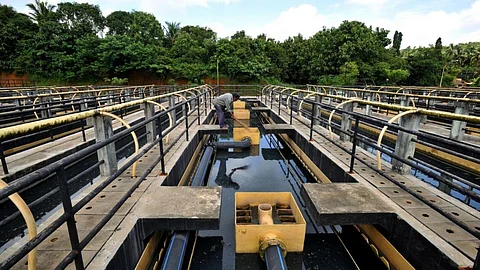
- Topics
- Feature
- Opportunities & Events
- About
- Hindi Portal
- Data
- Topics
- Feature
- Opportunities & Events
- About
- Hindi Portal
- Data

India’s sanitation crisis involves huge cost. Transforming the country’s sanitation and waste management by 2019 is tall order. “Swachh Bharat Mission, the most ambitious cleanliness campaign in Indian history could well be the most expensive failure in recent times,” says Naina Lal Kidwai, CEO of FICCI and the Chair of India Sanitation Coalition, a platform for partnerships to work towards achieving sustainable sanitation for India.
India's waste management woes are huge. Nearly half of Delhi does not have any sewerage network and the sewage sludge drains into the river. “Even if the country were to make significant gains in sanitation, it’s sewage, faecal and septage sludge management would still be a challenge,” says Kidwai in her opening remarks at a session on “Decentralised sanitation, faecal sludge and septage management” at the India Sanitation Conclave held at FICCI, New Delhi on April 26-27, 2018.
While there is incredible government zeal for promoting sanitation, little is being done on treating human waste. The focus of the government is on supporting the construction of toilets and making communities open defecation free. This is done mostly through concerted pressure and a range of coercive practices on the villagers like setting up nigrani samitis (watch committees) to ensure no individual from the village resorts to open defecation or through withdrawal of entitlements of citizens like food grains through ration shops.
“We are, as of now, not attaining global standards as far our urban sewerage systems are concerned and have poor coverage. We should look at decentralised options for faecal and septage sludge management. There is a need to create an ecosystem that allows entrepreneurs who venture into this to flourish,” Kidwai says.
While moderating the session, Ganapathy P.G., senior investor and advisor on infrastructure and sanitation says, “In the last few years, faecal sludge and septage management systems have entered the policy dialogue and to an extent, practice too. These are less capital intensive and quicker to implement while larger sewage treatment plants are power intensive, have low capacity utilisation and low coverage.”
Manas Rath, senior advisor South Asia, BORDA believes that there is a need to look beyond toilets and to collection, treatment and disposal or reuse of faecal sludge. “This is a central challenge in achieving the vision of an ‘open defecation free’ India,” he says.
“While larger city-wide systems can be good for denser areas in cities, as per a central pollution control board (CPCB) report, 39 percent of the existing sewage treatment plants do not conform to the general standards prescribed under the Environmental (Protection) Rules for discharge into streams.
Besides, 30-40 percent population outside the core of the city would still be left out of these centralised sewage systems. Decentralised faecal and septage management systems are appropriate for them. These are extremely affordable, costing around Rs 600-700 per capita, which is way below Rs 3000-4000 per capita for large-scale city-wide systems. Big cities need a judicious combination of both these systems,” says Rath.
As per a report by WaterAid India, on-site pit latrines and septic tanks account for a good proportion of toilets (48 percent) in urban India and it is still increasing.
Till a decade ago, the government had focused on centralised sewerage and treatment. When the national urban sanitation policy (2008) tasked state governments with drafting state urban sanitation policies, states sought decentralised options to develop city sanitation strategies.
Rath says the sanitation sector is enormous with a business potential of $ 4.5 billion in the next 10 years. “There is a ready market for faecal sludge and septage systems; 6500 such systems have already been installed of which 4500 are functional even without much effort on advocacy. A huge segment of private-sector operators function in an informal environment which needs to be brought under a regulatory umbrella,” says V. Srinivas Chary, director, Administrative Staff College India, Hyderabad.
According to Sunil Prabhu, resident editor, national affairs, NDTV, though faecal sludge management and decentralised systems could address the huge gap that exists between sewerage infrastructure and the sewage generated in the cities, multiplicity of agencies and fragmented institutional roles and responsibilities need to be addressed. “Citizens and resident welfare associations need to be involved much more in any such endeavour,” says Prabhu.
While faecal sludge management and septage system is the right way forward, procuring land for these systems remains a challenge. Equally challenging is bringing the operators under a regulatory platform. As a solution to the challenges in the effective implementation of the system, Velidandla Sasanka, CEO, Consortium for DEWATS Dissemination (CDD), Bangalore lists a few points.
Pollution control boards and monitoring laboratories need to be brought on board.
Single window clearances should be given to operators for setting up faecal sludge management and septage systems.
Funding could be shored up through innovative means like the hybrid annuity public-private partnership model for sewage treatment plants done recently at Varanasi and Haridwar under the National Mission for Clean Ganga. Here, the government provides 40 percent of the capital investment upfront, and the balance is met through an annuity over the contract duration, which can be up to 20 years. The operation and maintenance responsibility remains with the private entity building the system.
Rahul Sharma, Technical Expert, GIZ feels the need to discuss the management of greywater or wastewater that does not have faecal contamination. We need a reality check with our sludge management systems and policies before hoping to be open defecation free. “Otherwise our rivers would be cleaner, but not our towns,” says Sharma.